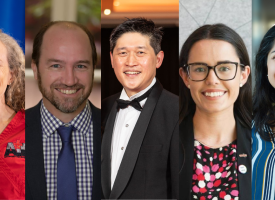Transcript - Dr Gannon - ABC - Gonorrhoea, National Centre for Disease Control
Transcript: AMA President, Dr Michael Gannon, ABC News, with Celina Edmonds, Tuesday 3 April 2018
Subject: Multi-resistant Strains of Gonorrhoea, National Centre for Disease Control
CELINA EDMONDS: Australian medical researchers say they have made an important step forward in understanding why a strain of gonorrhoea has become resistant to antibiotics. A team from Monash University says it now understands how the disease evades the immune system and that's opened the door to potential treatments. Cases of gonorrhoea have risen by 63 per cent in the past five years.
The President of the Australian Medical Association, Dr Michael Gannon, joins me now from Perth. Dr Gannon, thanks very much for your time. With the rise in cases of gonorrhoea, I imagine this is an extremely significant discovery?
MICHAEL GANNON: Yeah, this is important news. What we're seeing is the emergence of multi-resistant strains of the gonorrhoea bacteria and many experts have said that it might be the first bacteria of the post-antibiotic era. No longer is it the case that the majority of strains are treatable with simple penicillin, so any development which enables us to treat the infection so it's got less ability to spread is a welcome one.
CELINA EDMONDS: So does this relate to the gonorrhoea superbug?
MICHAEL GANNON: Well, when we use the word superbug, that's what we're talking about. We're talking about multidrug resistance. Let's not forget, we have not seen a new class of antibiotics for a generation and we're seeing the emergence of more and more types of individual bacteria like golden staph, like VRE, and now like multi-resistant gonorrhoea that are escaping the control of second and third classes of antibiotics. So any research which gives us ability to overcome bacteria like this is more than welcome.
CELINA EDMONDS: Yes. So, this discovery in relation to gonorrhoea could mean breakthroughs for other antibiotic-resistant diseases, then, as well.
MICHAEL GANNON: Well, that's exactly right. So, we need to do a lot better when it comes to stewardship of antibiotics. That means there's responsibility on behalf of individual doctors, it's responsibility on behalf of the community. When a doctor says to you this is a virus, not a bacterial infection, don't demand antibiotics. But ultimately, we live on a single planet and a lot of the antibiotic resistance is coming from overseas, inappropriate use in agriculture. So, new ways of treating bacterial infections, that's so important.
CELINA EDMONDS: Yes, so this requires a re-education of people that- who have perhaps gotten used to being able to go to the doctor and get antibiotics for whatever the problem is. Actually, re-educating them to say: look, you don't need antibiotics.
MICHAEL GANNON: Well, that's exactly right. So if you have been diagnosed with a viral infection, just-in-case antibiotics. It's not the case that they're harmless. They have got a cost, they've potentially got side-effects, and they contribute to antibiotic resistance in the wider community. So we do need to look at public education. We also need to prevent infections in the first place wherever we can through vaccinations. So where vaccines are available against bacteria or where vaccinations - for example - is available against influenza, you can prevent the secondary bacterial infection by stopping the primary viral infection. Preventative measures are always best.
CELINA EDMONDS: In relation to gonorrhoea, it's concerning that the number of cases continue to rise. What is the answer there in preventing the spread of that disease?
MICHAEL GANNON: Well, we're particularly concerned that a significant proportion of that increase has been in Aboriginal communities in Central Australia. What we see is very mobile communities moving between Queensland, Northern Territory, South Australia, and Western Australia. We are concerned about the ability of the individual jurisdictional health authorities to talk to each other. In the past, we've called for a National Centre for Disease Control. We need innovative solutions. Sadly, an old friend, gonorrhoea, and another old friend, like syphilis are re-emerging. We need to act, we need to act now.
CELINA EDMONDS: Dr Michael Gannon, thanks very much for joining us.
MICHAEL GANNON: Pleasure, Celina.
3 April 2018
CONTACT: John Flannery 02 6270 5477 / 0419 494 761
Follow the AMA Media on Twitter: http://twitter.com/ama_media
Follow the AMA President on Twitter: http://twitter.com/amapresident
Follow Australian Medicine on Twitter: https://twitter.com/amaausmed
Like the AMA on Facebook https://www.facebook.com/AustralianMedicalAssociation



